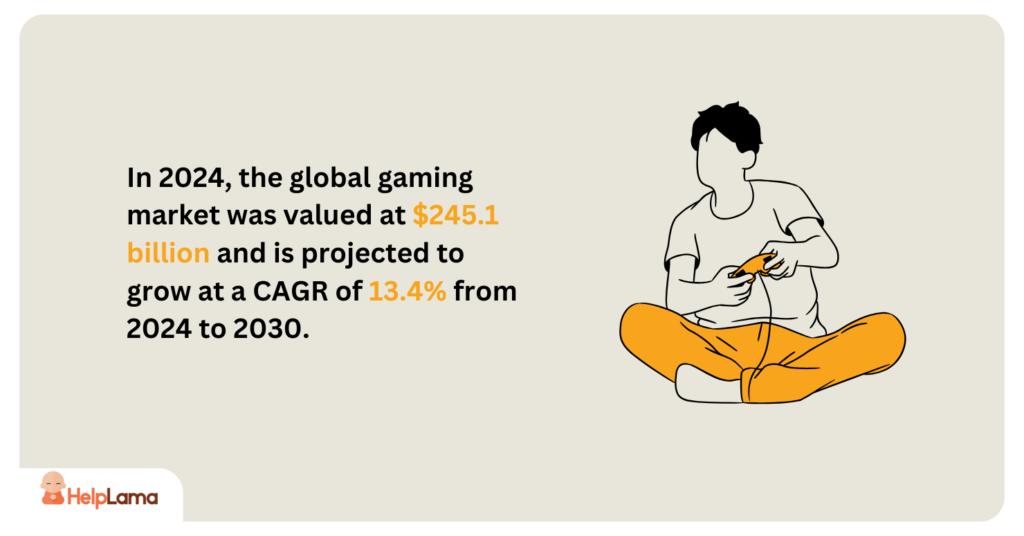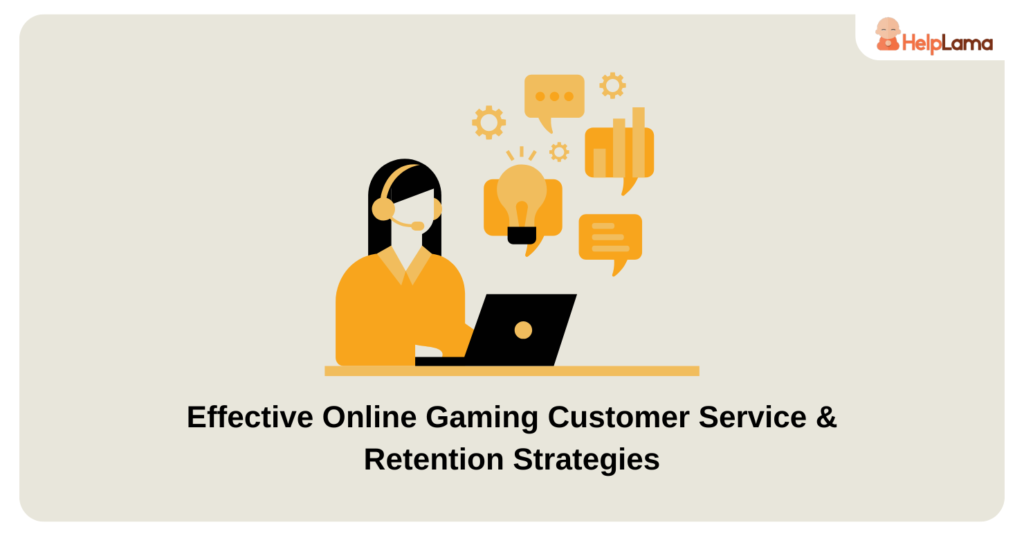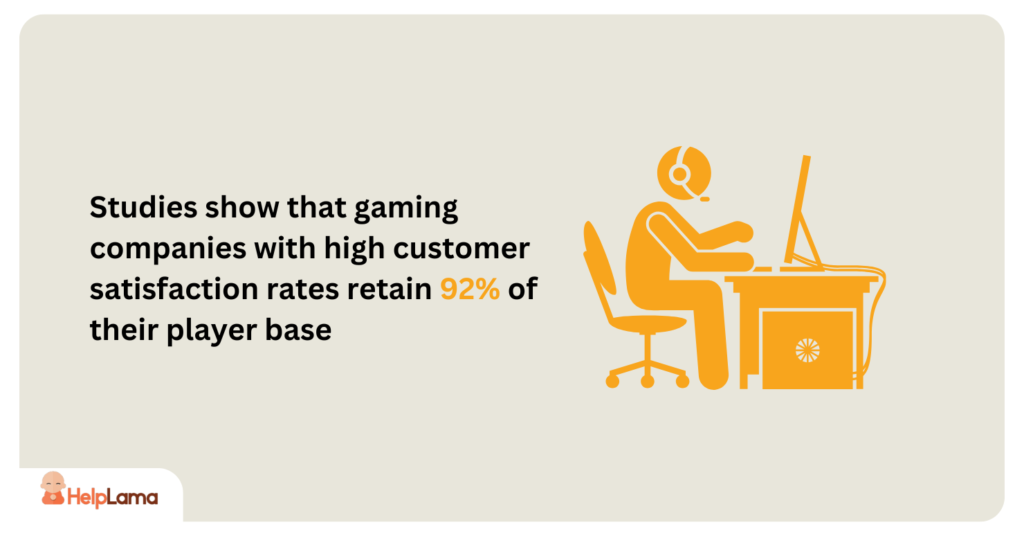Last Updated: April 2025
The online gaming industry is thriving like never before. In 2024, the global gaming market was valued at $245.1 billion and is projected to grow at a CAGR of 13.4% from 2024 to 2030. With over 3.09 billion gamers worldwide, the need for effective gaming customer service has never been greater. Gamers expect real-time support, quick resolutions, and a personalized experience to keep them engaged and satisfied.

Retention is a major challenge in the gaming industry. Studies show that only 15% of gamers stick with a game for more than 30 days after installing it. This highlights the importance of not just creating engaging gameplay but also offering a seamless customer service experience. A well-executed gaming customer service strategy can make the difference between retaining loyal players and losing them to competitors.
In this blog, we’ll explore the most effective online gaming customer service and retention strategies to ensure your players stay satisfied and engaged.
Table of Contents
Why Gaming Customer Service Matters
It will be noticed that the nature of the gaming community is different from customer service in another sector, which is why it is far from easy for customer service to be a simple and mere function. For these reasons, gamers are more than buyers; they are not too passionate, but they are very deeply involved in their games.
Also, while sectors such as the new amusements are moving ahead at the speed of light, matters such as lag, technical errors, or account exclusions can trigger intense frustration in players.
A study by Newzoo revealed that 78% of gamers would abandon a game if they encountered poor customer service. Additionally, 65% of gamers have admitted to switching to a competitor after just one negative experience. This shows that offering excellent gaming customer service isn’t just about solving issues, it’s about building trust and loyalty.
Key Challenges in Gaming Customer Service
Providing gaming customer service comes with its own set of unique challenges:
- Real-Time Support Needs
Online gaming is fast-paced, and gamers expect immediate resolutions. A technical glitch during a live multiplayer match can cost a player their ranking or reward, leading to frustration. - Complex Technical Issues
Unlike traditional customer service, gaming issues involve complex technical and in-game mechanics. This requires agents to have deep product knowledge and technical expertise. - Multilingual and Global Reach
Gaming is a global industry, and gamers expect support in their native language. Providing consistent service across different time zones and languages adds to the challenge. - Emotional Stake
Gaming is more than a pastime for many, it’s a passion. When things go wrong, players can become emotional, making it essential for customer support agents to show empathy and understanding.
Security and Privacy Concerns
Issues related to hacking, account theft, and in-game fraud are common in online gaming. Ensuring secure and reliable customer support is crucial to maintaining player trust.
Effective Strategies for Exceptional Gaming Customer Service
1. Personalized Support
Gamers appreciate when support feels tailored to their individual needs. Addressing players by their username, recognizing their in-game achievements, and understanding their playstyle help create a more personalized connection.
Example: Riot Games (creators of League of Legends) use player data to customize support responses, referencing specific matches and stats when handling player issues.
2. 24/7 Multichannel Support
Gamers play at all hours, so offering 24/7 support through multiple channels (live chat, email, phone, and social media) ensures players can get help whenever they need it.
Stat: Studies show that companies offering multichannel support see a 9.5% increase in customer retention compared to those with single-channel support.
3. Fast and Efficient Problem Resolution
Speed matters in gaming customer service. Resolving issues quickly prevents player frustration and minimizes downtime. Implementing AI-powered chatbots can help handle common issues instantly while escalating complex problems to human agents.
Example: Blizzard Entertainment (creators of World of Warcraft) reduced response times by 30% after implementing AI-based customer support.
4. Empathetic and Friendly Communication
Gamers may be frustrated when reaching out for support. Training agents to show empathy, acknowledge the player’s frustration, and provide clear solutions helps build trust and satisfaction.
Tip: Avoid using technical jargon unless the player demonstrates technical knowledge. Use simple, direct language.
5. Self-Service Portals and Knowledge Bases
Many gamers prefer to resolve issues independently. A comprehensive self-service portal with FAQs, troubleshooting guides, and video tutorials empowers players to find solutions quickly.
Stat: Research shows that 67% of gamers prefer self-service options over direct interaction with customer support.
6. Community Engagement and Support
Gaming communities are highly active on platforms like Reddit, Discord, and Twitter. Monitoring these channels and providing proactive support strengthens relationships and enhances brand reputation.
Example: Bungie (creators of Destiny) actively engages with their player community on social media, responding to feedback and providing real-time updates.
7. Feedback Implementation and Continuous Improvement
Actively gathering and implementing player feedback helps refine both the game and customer support. Using post-support surveys and monitoring player forums can uncover valuable insights for improving service.
Stat: Companies that actively implement customer feedback see a 20% increase in player retention rates.
8. Proactive Support Through Predictive Analytics
Using data to identify patterns and predict issues before they arise can prevent problems from escalating. Machine learning can detect common bugs and notify customer support teams before they become widespread issues.
Example: Electronic Arts (EA) uses predictive analytics to identify and resolve server issues before they impact players.
9. Secure and Transparent Handling of Issues
Trust is crucial in the gaming world. Providing clear timelines for issue resolution, ensuring data privacy, and updating players regularly on progress help build long-term trust.
Tip: When a security breach occurs, transparency about the cause and corrective actions is critical.
10. Continuous Training for Customer Support Teams
Gaming evolves rapidly, so customer support teams need regular training on new game features, bugs, and industry trends. This ensures they are prepared to handle the latest issues effectively.
Example: Ubisoft conducts quarterly training sessions for its support team to keep them updated on the latest game patches and updates.
How Technology Enhances Gaming Customer Service
Technology plays a pivotal role in modern gaming customer service.
- AI-Driven Chatbots – These robots can assist customers in getting straightforward responses rapidly when they are on their websites or apps, and they can redirect the more difficult stuff to the human agents.
- Automation – It’s designed to automate such routines as entering data and allow customer service teams to focus on the main activities.
- Data Analytics – Data inputs are captured as player indicators, and outputs like the prediction of potential user abandonment are also captured.
- Cloud-Based Support Systems – These systems should provide for consistent support across different platforms and devices.
Outsourcing – If you engage with dedicated customer service provider partners, you will get around-the-clock global support along with propelling specialization.
Video Game Customer Support Agent
Role of a Video Game Customer Support Agent
A video game customer support agent plays a crucial role in ensuring player satisfaction and retention. In the fast-driven and highly competitive gaming industry, players demand immediate and useful solutions to their complaints. A single technical error or account-related concern has the potential to trigger irritation, and ultimately, the player decides to stop playing.
Therefore, the role of a customer support agent is crucial to the process of giving players an excellent and smooth gaming experience.
Customer support agents serve as the primary contacts of a gaming company. They handle a lot of cases, including technical problems, billing disputes, account recoveries, and in-game glitches. As opposed to traditional customer service, gaming agents must have extensive knowledge of game mechanisms, updates, and player behavior.
Familiarity with the game’s world allows them to deliver quick and exact answers, which means that players can continue playing the game without any waiting phasing out.
Key Skills and Responsibilities
Successful video game customer support agents possess a unique blend of technical expertise and communication skills. Some of the key responsibilities include:
- Technical Troubleshooting – Finding and engineering mechanisms in the game such as lag, crashes, and bugs.
- Account and Payment Support – Aiding players in login issues, account recoveries, and payment disputes.
- Player Behavior Management – Investigating and getting rid of player’s cheating, harassment, and misconduct behaviors.
- Multilingual Support – Delivering uniform care across different regions and languages.
- Community Engagement – Watching over social platforms, e.g, Discord and Reddit, to solve player problems.
- Empathy and Conflict Resolution – Introductory to how to handle nervous customers politely.
Why Customer Service in Gaming Matters
The quality of customer service in gaming directly impacts player retention and brand reputation. Studies show that 78% of gamers are likely to abandon a game if they encounter poor customer support. A well-trained video game customer support agent can prevent this by delivering quick, empathetic, and effective solutions.
Take Riot Games, for instance. They tailor their replies to players using game data, which makes players feel important and heard. Blizzard does something similar. They use AI to answer faster, so players can spend more time playing instead of waiting for help.
When gaming companies put money into hiring good support staff for video games, it pays off. Players stay loyal, the community trusts them more, and the company does well in the long run. This matters a lot because the gaming world is tough to compete in.
Helplama: Best Outsourced Gaming Customer Service Company
Helplama is a strong choice for outsourced gaming customer service due to its specialized support for player interactions. Its agents are trained in gaming terminology and player behavior, ensuring effective communication and problem resolution. Helplama offers 24/7 live chat and phone support, handles technical issues and account recovery, and provides scalable staffing during game launches and updates. Its real-time performance tracking helps improve customer satisfaction and operational efficiency.
Key Features:
24/7 live chat and phone support
Expertise in technical issue resolution and account recovery
Scalable staffing for major game events
Player-friendly tone and communication
Real-time performance tracking and feedback integration
Conclusion
Exceptional gaming customer service is no longer optional, it’s a necessity in today’s competitive gaming landscape. With billions of gamers worldwide, ensuring quick, personalized, and reliable support is key to building player loyalty and increasing retention.
By offering multichannel support, using AI-driven automation, implementing player feedback, and training support teams continuously, gaming companies can create a seamless customer experience. Studies show that gaming companies with high customer satisfaction rates retain 92% of their player base, proving that investing in customer service directly impacts long-term success.
By adopting these proven strategies, gaming companies can not only retain loyal players but also create a gaming experience that keeps them coming back for more.







